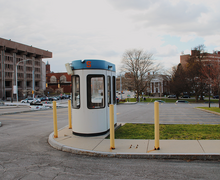Previous health care column exaggerates health care proposal
I would like to address several problems with Elliot Kartus’s column on the House health care bill, H.R. 3962 (‘Health care bill could have hidden consequences for Americans,’ Nov. 18th). For starters, and I admit this is pretty minor, the bill is under 2000 pages. Granted, it’s still a whopping 1990 pages, but please don’t exaggerate. However, there are much more serious problems with what he says, which I will examine here.
For example, Mr. Kartus says that ‘section 7201 of the bill states that anyone convicted of willfully evading the mandate can be fined up to $250,000 or sentenced to a maximum of five years in prison.’ There is no section 7201 in the bill. Section 7201 is a section of the Internal Revenue Code which establishes a penalty of up to a $100,000 fine and up to 5 years in jail for evasion of income tax. This law has been on the books since 1939, and fewer than 100 people were prosecuted under it last year, according to the Wall Street Journal. The Internal Revenue Code was last amended in 1986, when the maximum fine for tax evasion was increased from $10,000 to the current $100,000, and this fine will not be affected in any way by this bill.
The relevant section in the health care bill, section 501, places a 2.5% increase on the income tax of anyone who still pays tax after all exemptions, and does not amend the existing penalty for nonpayment in any way. The United States has the lowest tax burden in the industrialized world. Frankly, even in this economy, we can afford to pay a tiny bit more, especially since the Congressional Budget Office estimates that the health care bill will not increase deficit spending. A small tax increase like this one could easily help the long and difficult process of paying off the national debt, provided that spending does not continue to outpace taxes.
Finally, Mr. Kartus claims that ‘never before in the history of the U.S. has the federal government attempted to make a law that forces private citizens to purchase something from the government or a private company.’ This is, again, not true. All taxes are a government requirement that individuals buy a service. He thinks we should be able to opt out of the health care plan and not be required to pay for it? Fine. I’m a pacifist, so why can I not opt out of my taxes funding the military? My house has never been on fire, so why can I not opt out of my taxes paying for fire departments? I don’t own a car, so why can I not opt out of my taxes paying for roads? I have no children, so why can I not opt out of my taxes paying for schools? Because all of those things, like health care, are vital public services, and everyone who can pay for them has a responsibility to pay for them, even if they do not personally use the services in question. A country’s taxes are the price you pay for living there. In more private-sector-friendly terms, think of it as a membership fee.
Mr. Kartus’s column was full of rumors, distortions and exaggerations. The way he phrased his claims made me think that any research he did on this topic was done sloppily and uncritically. When you look at the actual text of the health care bill, it is obvious that concerns over the so-called penalty for ‘willfully evading the mandate’ are exactly what some supporters of this bill have already dismissed them as: unsubstantiated panic along the lines of the paranoia earlier this year over non-existent ‘death panels.’ If I may, I would advise Mr. Kartus to research more carefully next time he writes about a political controversy to make sure he’s covering facts, not rumors. Unless you intend to follow the example of a couple from my home state of New Hampshire, who stockpiled food and guns, fortified their house and threatened the IRS with violence if they attempted to collect income tax from them, you have no reason to worry about the effects of this bill on taxes.
Sincerely,
Paul Wiele
Junior psychology major
Published on November 18, 2009 at 12:00 pm





